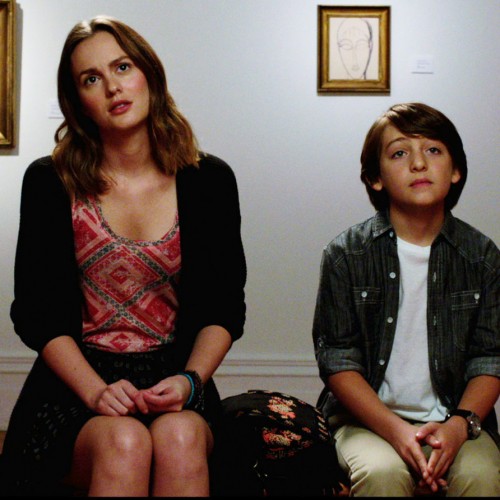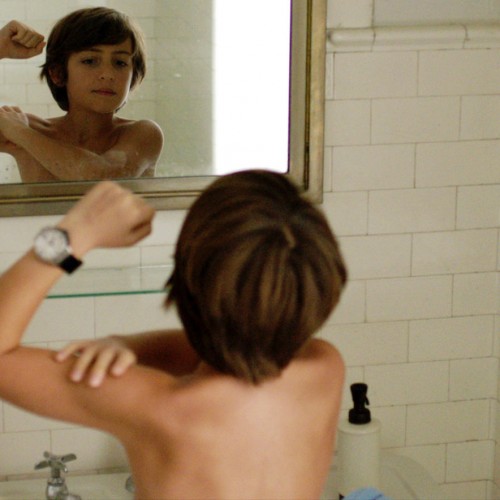An Unconventional Love
Frank Whaley is probably best known for his acting roles in Pulp Fiction, Swimming with Sharks and The Doors, but he’s also written and directed a few movies over the years, most notably 1999’s gritty Joe the King, about the hellish life of an abused boy from a badly broken home.
His latest directorial effort, Like Sunday Like Rain, is about an entirely different sort of boy. Twelve-year-old Reggie (played with remarkable poise by newcomer Julian Shatkin) is a New York City rich kid and all-around prodigy who not only plays cello beautifully, but composes serious music. The film centers on the growing rapport between him and his 20-something nanny Eleanor, an equally lost soul played with nice understatement by Leighton Meester. Like Sunday Like Rain is a somewhat conventional film about an unconventional relationship. Though bumpy in places, this buddy movie/love story is elevated by Jimi Jones’ languid cinematography and the two leads’ performances and repartee.
At the movie’s start, Eleanor breaks up with her boyfriend Dennis, an undependable musician who causes her to lose her barista job. Played by Green Day’s Billie Joe Armstrong in his feature film debut, Dennis is a bratty loser type and Armstrong doesn’t add much to the part. Meanwhile Reggie’s distant, preoccupied mother (Debra Messing in a one-note role) is planning to visit her husband — Reggie’s stepfather — overseas and needs a new nanny pronto. With no real experience or references, Eleanor is sent by an agency and hired on the spot. (What agency in litigation-happy NYC would do that?!) At least this unlikely scenario is acknowledged when Eleanor discusses her surprising luck with a friend. Somewhat mitigating the situation is the presence of an affectionate housekeeper and her temporary replacement, who provide meals and additional supervision.
Eleanor, who is tasked with making sure that Reggie – a strict vegetarian — eats and gets to and from school, is visibly moved when she first hears him playing cello with his quartet (Ed Harcourt’s haunting piece, the film’s title, is repeated throughout). Though clearly talented, he doesn’t plan to become a professional musician. “‘When I grow up?,’” he chuckles indulgently at her question. “The prospect of ending up a bitter and lonely drunk does not appeal to me.” In fact he’s lost his appetite for music, declaring that “Art as a language is dead” and that he’s “burnt on the cello.” Slatkin is very natural as an intellectually gifted kid expounding on various ideas with great confidence. This could have come off as obnoxious but the character’s self-awareness and lack of arrogance make him likeable.
When the enterprising Reggie buys his way out of attending summer camp, he and Eleanor roam around Manhattan and develop a deep friendship. The hapless Dennis keeps appearing in an attempt to win Eleanor back and Reggie becomes increasingly curious about her life. In one amusing scene he offers to talk to his driver about using the guy’s mob connections to take care of Dennis. Later, upon hearing that her father has been hospitalized, Eleanor travels upstate to reconnect with her estranged working-class mother and stepfather, bringing Reggie along to witness some difficult scenes. We find out that she had a promising musical career cut short by financial woes.
Due to various circumstances, the friendship cannot continue, much to Reggie’s dismay. The movie ends on a sweet if somewhat tidy note. Not until now do we see Reggie displaying any kind of emotion. Though we’re thankfully spared typical scenes of him being bullied by classmates, etc., there hasn’t really been much indication that he might be suffering through what must be a difficult childhood.
It apparently took six years for Whaley to raise financing for the film and his tenacity is commendable. Despite uneven acting and some lack of character development, Like Sunday Like Rain is notable for the performances of its two main characters and their obvious chemistry. It’s also gratifying to see an unusual, unclichéd relationship onscreen. It reminds us that love comes in many forms and that it should always be valued, as it clearly is in this film.
Like Sunday Like Rain opens on Friday at Village East Cinema, 189 Second Ave., Manhattan.
Film Fests
Through March 15, the Film Society of Lincoln Center hosts its 20th annual Rendez-Vous with French Cinema, North America’s leading showcase for new French film, co-presented with Unifrance Films. Among its many worthwhile selections are Love at First Fight, a coming-of-age story directed by Thomas Cailley; and Party Girl, the debut feature from Marie Amachoukeli-Barsacq, about an aging nightclub hostess’s decision to settle down. They and other directors will be present for Q&As.
Films are screened at the Walter Reade Theater (165 W. 65th St.), IFC Center (323 Sixth Ave.) and BAM (30 Lafayette Ave., Brooklyn).
From March 18 -29, the Society holds its annual New Directors/New Films Festival, at which the work of emerging filmmakers from around the world is shown. Co-presented with the Museum of Modern Art, the festival opens with Marielle Heller’s directing debut The Diary of a Teenage Girl, which depicts the adventures of a 15-year-old in 1970s San Francisco.
Films are screened at MoMA (11 W. 53rd St.) and at the Walter Reade Theater (165 W. 65th St.).
—Marina Zogbi



